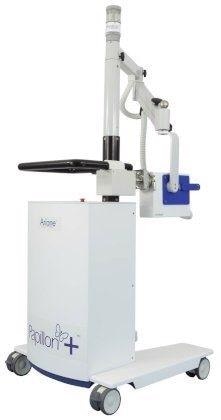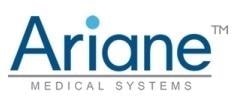The International Agency for Research on Cancer (IARC) reported in 2020 that estimates assume as many as 1 in 5 people globally could experience a form of cancer during their lifetime.

Image Credit: Shutterstock/Lightspring
Among the key drivers of this increase are a global aging population and many socio-economic risk factors. The demand for accessible, cost-effective, efficient and patient-centered cancer therapy and treatment is on the increase.
Ariane’s Papillon+™ system offers a clinically led solution which recognises these changing factors. Offering medical practitioners access to successful organ preserving rectal treatment, superficial skin and intraoperative options including breast IORT, all delivered from an Operation Room (OR) friendly, mobile platform.
Principles of X-Ray brachytherapy
X-Ray brachytherapy is a short-range radiation therapy technique for treating accessible tumors locally, particularly in the breast, rectum, skin and IORT.
The Papillon+™ X-ray tube delivers low energy X-rays but at a higher dose rate than many other systems reducing treatment times and OR costs.
Duration, dose and the number of X-Ray brachytherapy fractions are determined by the stage and severity of the tumor, which means this treatment can be specifically tailored to a patient’s needs as part of a personalized care package.
Centering patient choice and care
The Papillon+™ X-Ray brachytherapy system from Ariane has been developed and designed with patient welfare, choice and successful treatment at its heart.
This already popular system is becoming widely accepted and validated, offering an effective means of treating ‘easy-to-access’ cancers.
The Papillon+™ system offers a practical, less invasive alternative to high-dose-rate radioisotopes for skin-focused, rectal and IORT (including breast) procedures. Ongoing work means that these capabilities are expanding to include intra-vaginal and laparoscopic X-Ray brachytherapy.
The compact footprint, mobile housing and extended reach make the Papillon+™ ideal for use across an extensive range of settings, especially in the operating room. The system offers exceptional positioning abilities, making access to localized cancers easy while safeguarding patient comfort.
The Papillon+™ was designed with OR access in mind. Encompassing features such as being battery-powered and remote control via an encripted Wifi bench- or trolley-mounted workstation that includes a user-friendly touch screen display and PC base unit.
This configuration enables remote operation and interchangeable treatment room access while minimizing cabling requirements and ensuring the safety of both patient and staff.
The Papillon+™ instrument is powered by a Micronode© monoblock-type setup which incorporates a high voltage generator and X-Ray tube.
The system can produce around 150 watts of power, extracted via forced liquid cooling – this enables the delivery of up to 20 Gys per minute via a 310° homogeneous beam, contingent on the particular treatment requirements and application setting.
The system also contains a variety of optional features, including the Monitus™ on-board controlled area warning system (with the capacity to activate a series of radiation-on alert lights) and the Prefectus™ quality assurance system (with the capability to easily verify dose and beam energy rapidly against pre-determined reference measurements).

Image Credit: Ariane Medical Systems
Papillon+™ in practice
The X-Ray tube incorporated into the Papillon+™ instrument comes with an interchangeable treatment adaptor, meaning it can be employed across a wide variety of treatments and in different scenarios.
Rectal treatment
While surgery continues to be the dominant paradigm for rectal cancer treatment, alternative methods are becoming increasingly necessary, driven by the importance of patient choice, quality of life issues and the increasing prevalence of personalized care approaches.
Papillon+™ can be employed for the treatment of rectal tumors where these are T1 – T3 with minimal or no nodal involvement which are located in the lower colon. Historically speaking, such cases have required radical surgery, often necessitating the removal of the anus and leaving the patient with a permanent stoma.
Depending on the size of the tumor, as well as staging and positioning, there is the possibility to apply Papillon treatment in isolation or together with external beam radiotherapy, chemotherapy or other local surgical techniques.
The method of this approach – and the rise of national screening programs and early detection – ushers in a much less harmful, more economical option for treating rectal tumors.
Breast treatment
Papillon+™ can be utilized for intraoperative radiotherapy – i.e., carrying out internal radiotherapy treatment to a tumor site exposed through surgery while a patient remains under general anesthesia. Application of low-energy X-Rays to an exposed cavity is possible following the extraction of a tumor in breast-conserving lumpectomy surgery.
Delivering the recognised treatment dose of 20 Gy of treatment in a market leading less than 120 seconds, this process nominally increases existing procedure time. The rapid dose rate and penetration of over 50% @ 5mm offer a good clinical and cosmetic option whilst significantly reducing the time that patients must be kept under anesthetic using similar products.
In particular, in this post-COVID world, this rapid IORT option offers patients the chance to be treated in one day, reducing hospital visits and freeing up expensive linac time for other treatments.
Skin treatment
The aging global population has seen the prevalence of non-melanoma skin cancers (NMSC) increase over time. In particular, Squamous Cell Carcinomas (SCC) and Basal Cell Carcinomas (BCC) as a result of sun exposure.
These tumors are clinically non-invasive and typically grow slowly, constituting>75% of all skin cancers.
These cancers are usually located on vulnerable sites that are regularly exposed, including the hands, face, ears and neck, which raises particular cosmetic issues and aesthetic considerations where there is a need to ensure scarring and side effects are kept to a bare minimum through non-invasive therapies.
X-Ray brachytherapy has demonstrated the ability to offer excellent local control and outstanding cosmetic results for the treatment of T1 and T2 tumors.
The accessible range of applicators or the Papillon+™ makes this instrument well-suited for treating skin cancers, especially when considering the diverse and sensitive nature of their locations.
Summarizing the business case
In addition to offering patients exceptional benefits, the economic, affordable Papillon+™ X-Ray brachytherapy system from Ariane offers radiotherapy or brachytherapy departments a vast range of benefits.
Reducing the necessity to carry out surgery leads to a reduction in costs – both in terms of the surgical procedure itself and the ongoing care requirements. This is of particular importance when taking into account the long-term care implications of stomas.
The capacity to access rapid treatment while reducing potential complications is also a core element in increasing patient throughput while sustaining excellent patient care.
The Monitus™ warning light alert system and Prefectus™ on-board quality assurance features support safe room use without the necessity for increased capital expenditure on modifying treatment or operating rooms.
These powerful features are combined with the system’s low-level shielding requirements, offering a genuinely mobile, dynamic solution for localized cancer treatments.
About Ariane Medical Systems
 X-ray brachytherapy: Breast, rectal & skin cancer treatment with the Papillon +
X-ray brachytherapy: Breast, rectal & skin cancer treatment with the Papillon +
Ariane Medical Systems Ltd was incorporated in 2005 to optimize the use of low energy X-rays for the treatment of accessible tumors. Working closely with clinical partners the Papillon50 X-ray Brachytherapy system was developed to treat lower rectal tumors. The Papillon 50 is now treating patients in Denmark, France, Sweden, Switzerland and the UK.
In 2016 the Papillon+ X-Ray Brachytherapy system was developed to deliver an Intra-Operative Radiotherapy (IORT) Boost to tumor beds as well as the tumor itself.
Sponsored Content Policy: News-Medical.net publishes articles and related content that may be derived from sources where we have existing commercial relationships, provided such content adds value to the core editorial ethos of News-Medical.Net which is to educate and inform site visitors interested in medical research, science, medical devices and treatments.